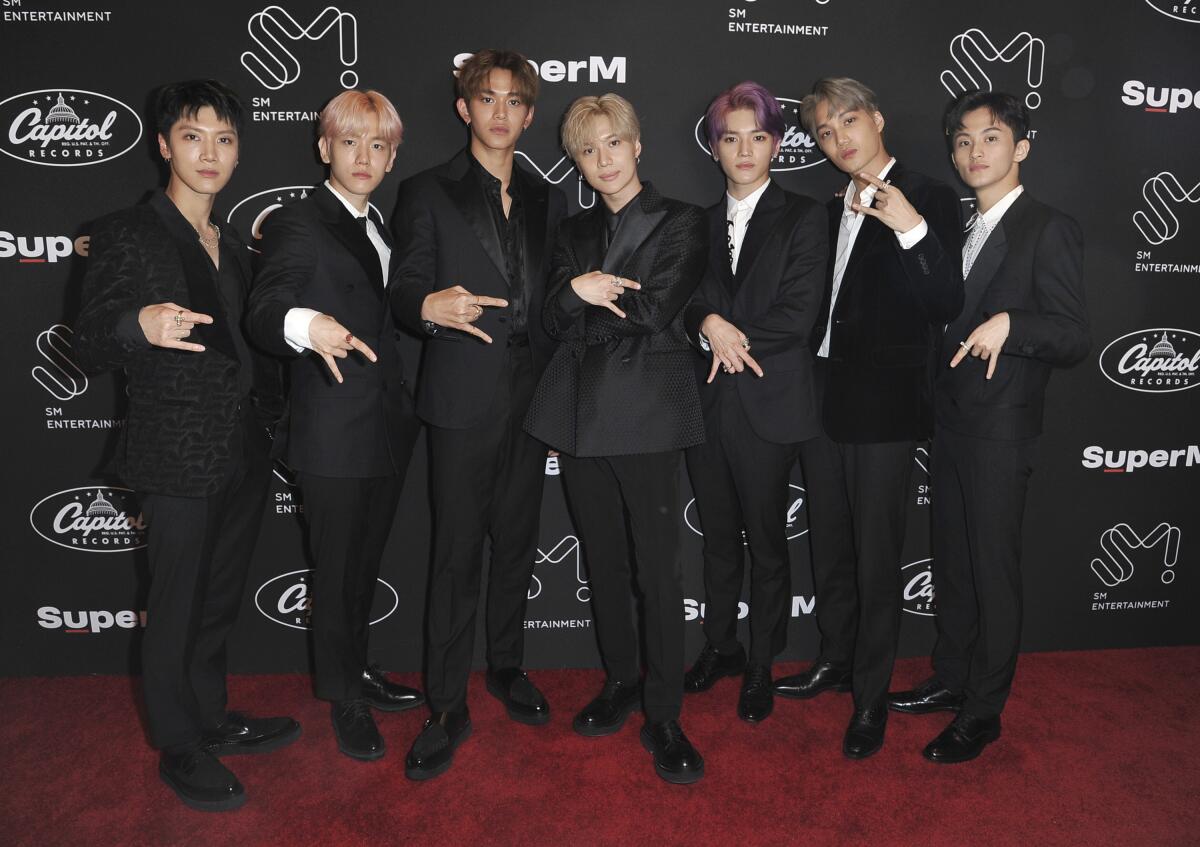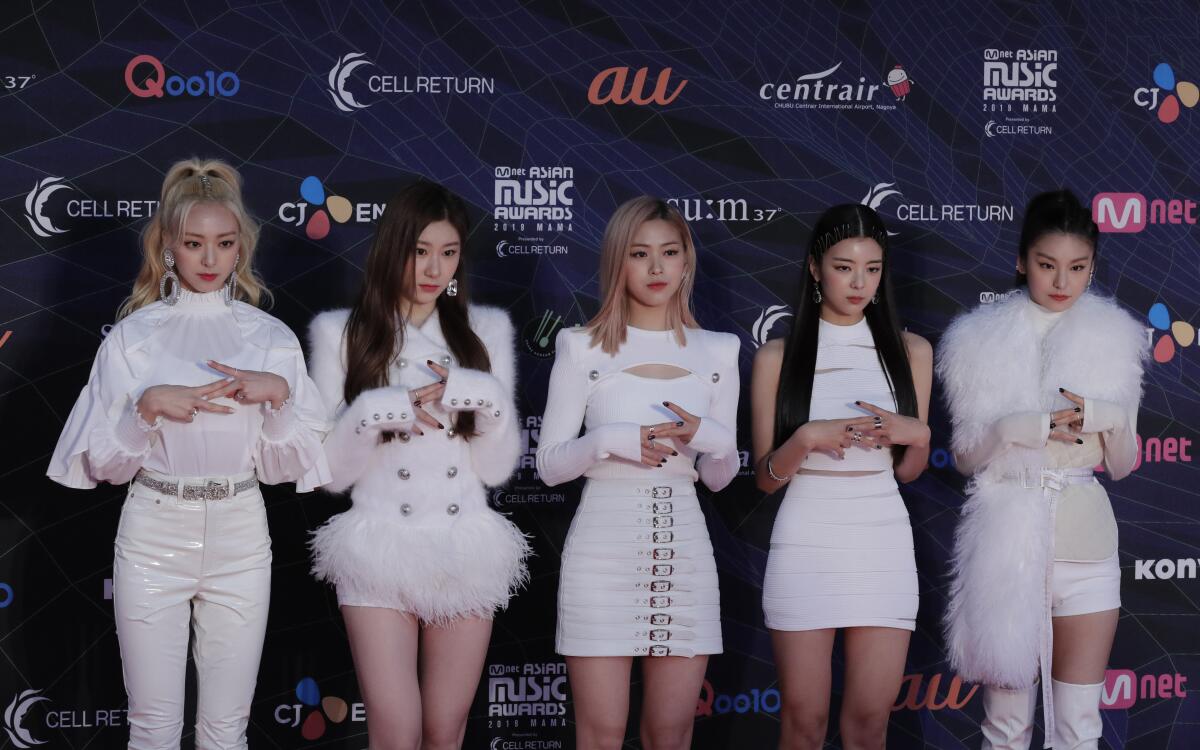Super M could be the new BTS and other K-pop predictions for 2020

- Share via
In 2019, K-pop saw some of its brightest lights and darkest hours.
There were huge successes in the scene, which shows no signs of slowing in the U.S. BTS’ triumph at the Rose Bowl; Blackpink becoming the first major K-pop act to perform at Coachella; groups like Monsta X signing with U.S. major labels and collaborating across genres. L.A.’s KCON, once again, helped drive the conversation around the genre in new and inclusive directions.
Yet after both the Burning Sun sexual assault scandal and the suicides of singers Goo Hara and Sulli, K-pop’s global legion of devoted fans had to confront the consequences of a corporate pop scene where stars are driven to exhaustion and policed in their personal lives, and yet its larger systems are rarely scrutinized.
The year 2020 will likely be a hugely consequential one for the genre, in South Korea and elsewhere. Can new partners keep established stars in the U.S. pop consciousness and bring new ones into the fold? Can global attention on mental health, misogyny and corporate opaqueness in K-pop drive real change? Here are a few of the new stars and emerging narratives to watch out for next year in K-pop.
1. Is Super M the next supergroup?
Collaborations, subgroups and member swaps are as common in K-pop as crossover episodes were in ’90s sitcoms. But SuperM is a novel idea: a boy-band culled from top-tier K-pop acts, created by South Korean leviathan SM Entertainment and Capitol Records pitched largely for English-speaking countries. The group draws from popular acts NCT 127, Shinee, EXO and WayV. Its pedigree was secure enough for a Billboard 200 No. 1 album last year. But the way it was done — a public debut with a show outside the Capitol Records building in Hollywood and not in Seoul, and a largely English-language kickoff single “Jopping” — suggests that SM’s Lee Soo-Man and his U.S. counterparts are aiming this at a U.S. audience that doesn’t even see K-pop as especially foreign anymore. It could also make a solo star of singer Taemin, who has a slate of beguiling new music ready while his Shinee bandmates serve in the South Korean military.
Another interesting twist is that Super M brought back U.S. physical sales, a common way for Korean fans to declare allegiance to a group. In an age of ubiquitous streaming services, “The 1st Mini Album” earned 98% of its tally in album sales, which must have left Capitol executives toasting like they did in the mid ’90s. Rising acts like Ateez, TXT and X1 are already getting similar overtures from U.S. execs looking for the next BTS as well.
2. Itzy, Chungha, (G)I-DLE and girl groups’ next wave
Headliner Ariana Grande might have been only the second most popular female pop act with a high ponytail and something to prove at Coachella in 2019. Blackpink arguably put on a better show, and certainly did more to diversify the fest’s ranks as a launchpad for global pop. So who might be next? Twice is certainly a contender, after making its U.S. debut at the Forum in July. But take a strong look at Itzy, who won best new female artist at the MAMA awards (K-pop’s best analog to the Grammys) and the mercurial and independent-minded (G)I-DLE who both seem well-placed to pick up Blackpink’s mantle.

Also watch for Chungha, a former member of I.O.I. and a rare female solo act to have a major commercial breakthrough with her single “Gotta Go.” She also recently collaborated with Rich Brian on a compilation from the 88 Rising collective, an influential label for edgy Asian pop. The ’80s synths and pitch-twisted vocals on “These Nights” feel like Roger Troutman meets the “Drive” soundtrack.
3. Will Jannabi lead Korean rock or stumble out of the gate?
For all of K-pop’s futuristic inclinations, emo-tinged rock is having something of a resurgence there too. Acts like N.Flying and Day6 have had huge breakouts with earnest, guitar-driven hits that Panic! at the Disco and Lewis Capaldi fans could get behind (N.Flying, like Panic! has a lung-bursting “Frozen” cover of its own).
No band was better positioned to lead this Korean rock revival than Jannabi, who debuted in 2014 but recently vaulted to K-pop-level fame with the album “Legend” in March. They won the MAMA for best band performance with “For Lovers Who Hesitate,” which revives a pre-K-pop style of Korean rock balladeering, and sounds more like late-career Elliott Smith than the high gloss at KCON.
But the band hit several stumbles before getting a chance to break wide. Keyboardist Yoo Young-hyun left the band after being accused of bullying a classmate over a decade ago, and singer Choi Jung-hoon faced questions over any association with his father’s potentially suspicious business ties and friendship with disgraced politician Kim Hak Eui. Choi denied any meaningful connections (he made a long statement explaining his position in May), but in a South Korean music industry still reeling from Burning Sun, that could dampen the rise of the country’s most promising acts.
More to Read
The biggest entertainment stories
Get our big stories about Hollywood, film, television, music, arts, culture and more right in your inbox as soon as they publish.
You may occasionally receive promotional content from the Los Angeles Times.











